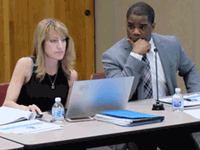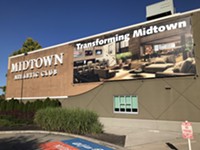[
{
"name": "500x250 Ad",
"insertPoint": "5",
"component": "15667920",
"parentWrapperClass": "",
"requiredCountToDisplay": "1"
}
]
I don't want to overreach with this, but there are lessons for Rochester in Hurricane Katrina --- and I don't mean the dangers of natural disasters.
As it was tearing off the roofs of houses and destroying neighborhoods, Katrina was also exposing the enormous divide between New Orleans' poor and not-poor. And if you don't see the parallel between Rochester and New Orleans, you haven't been paying attention.
Rochester --- and by "Rochester," I mean the Rochester region --- is an intensely segregated area. Affluent and poor, white and non-white: We live so separately that we might as well be in different states.
Well out of sight of the nice new homes going up in Mendon, Webster, and Perinton are the neighborhoods of inner-city Rochester, where the child-poverty rate is higher than in New York City, Washington, or Los Angeles. There are schools in which the poverty rate is way above 90 percent. Illiteracy, health problems, crime: In many ways, the situation in Rochester is as serious as New Orleans' has been. And yet we read the statistics and shrug. Or, worse, blame city officials, teachers, police.
When we do stare hard at the numbers and get a whiff of their ramifications for the region, we resort to the typical Rochester way of doing things.
Case in point: "A Call to Arms," the latest report by the latest blue-ribbon task force studying the problems of the Rochester school district. The district has the lowest graduation rate of all of the state's cities. More than three-fourths of its eighth-graders don't meet state standards in math and English. The reason, as the report comes close to admitting, is the district's concentrated poverty.
The report calls poverty a "challenge" that "can work against desired educational outcomes for many RCSD students." Well, what should we do about that challenge? The task force wants it to be easier for principals to get rid of bad teachers. It wants the district to save money by becoming more efficient. And it wants 10,000 people to volunteer to become mentors.
Now look: Nobody in their right mind wants the district to keep unqualified teachers --- or principals. Nobody in their right mind wants the district to waste money. And mentors can indeed help children.
But these kinds of recommendations, while important individually, are distractions. They take our focus off of the root of the problem: concentrated poverty.
In addition, the mentor idea, as it is presented in "A Call to Arms," is naïve. There is a crisis in the Rochester school district right now. "A Call to Arms" wants those 10,000 volunteers amassed by the end of 10 years.
And there's a magic-wand idealism in The Call's plan. People who have worked on successful mentoring programs all say the same thing: It ain't easy. First, you have to get permission from the parents whose children need mentoring --- permission from the folks who, for whatever reason, haven't been able to provide enough support for their children. Some parents welcome that help. Others do not.
Second, mentoring is time consuming, often draining, often discouraging. If you envision volunteering for a couple of hours a week for nine months, don't bother. Successful programs provide a mentor for an individual child for years. Having a child repeatedly lose a mentor is worse than having no mentor at all, says a friend of mine who is active in a Rochester mentoring program.
Then there's the business of funding. The Call task force envisions a staff that will recruit and train mentors and operate the program. The task force seems confident that the community will find the money for this. As for the needs of the school district itself: The task force agrees that the district needs more money. But it warns that "taxpayers are in near revolt," that foundations don't have enough money, that "the business community will not provide on-going subsidies."
Note this, too: A couple of months ago, City's Tim Macaluso reported on Superintendent Manuel Rivera's plan for a "Children's Zone," in which the entire community would focus on the needs of one of its poorest quadrants. Rivera envisions that effort encompassing health care, social services, housing, neighborhood development: everything imaginable to deal with the outside forces that affect children.
A Children's Zone would require existing organizations to expand their services. It would also require funding. Macaluso asked Rochester Business Alliance CEO Sandra Parker whether she thought business leaders would be willing to help fund the effort.
Her answer: No. "I am a strong believer that we don't need to put more funds into the district," she said.
So to deal with one of this community's most serious problems, we'll rely on volunteers, not trained professionals. I don't know whether to weep or retch.
And you can just smell our own Katrina, moving in on us.
Well, you ask, have I got a better idea? You betcha. A bunch of them. But let me give you just one:
Among the members of The Call's task force were several academics, including RIT's Simone. I applaud their interest in the school district. Let's have more. Let's have all the region's colleges and universities join in. And here's what I want them to do:
Join with the school district and create campus schools --- public schools that take both city and suburban students. Each one can have its own specialty. RIT, for instance, could create a feeder school for its technology programs. The only requirements: Each must be racially and economically integrated. And they must offer top-quality programs --- programs so strong and so exciting that suburban families will be frantic to enroll their children.
This will accomplish several things. It will begin to break down the concentration of poverty in the Rochester school district. It will demonstrate that this is the path to success for Rochester's poorest children. It will engage Rochester's academic community in a way that's more meaningful than service on blue-ribbon committees. It will let the region start building a qualified, home-grown labor force.
And it will give thousands of Rochester children the high-quality education they need and deserve.
A couple of weeks ago, as he was working on his article about The Call, City's Tim Macaluso ran my campus-school idea by Simone. Simone said he wasn't interested.
I'm not willing to leave it there.
Speaking of Rochester School District, school Segregation
-

Urban Action 8/14
Aug 14, 2019 -

In the RCSD-city fight, the children are losing
Jul 30, 2019 -

There's no one 'fix' for the RCSD's problems
Jun 18, 2019 - More »
Latest in Columns
More by Mary Anna Towler
-

Police reform: advocates on what should come next
Oct 22, 2019 -

Court clears the way for Police Accountability referendum
Oct 17, 2019 -

Dade outlines initial actions on district deficit
Oct 9, 2019 - More »





